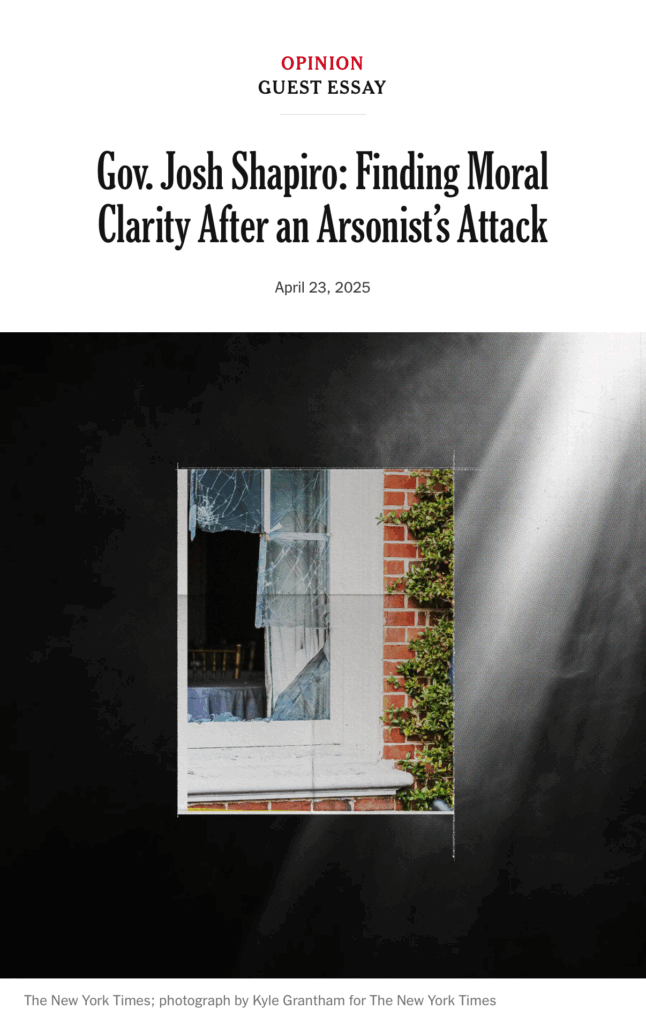Overdue Process
Plus: New advisors join our board. 🗳️
At an Oval Office event earlier this week, President Trump said that not everyone his administration is trying to deport should get a trial. He expressed similar sentiments on social media after the Supreme Court recently stopped the federal government from continuing deportations under the Alien Enemies Act.
Trump is wrong. There is no middle ground. The Sixth Amendment gives everyone in the United States the right to a “speedy and public trial.” And the Fifth and Fourteenth Amendments say that no one can be deprived of “life, liberty, or property, without due process of law.” These rights apply to everyone in this country, not just U.S. citizens.
These are foundational American principles. The government cannot arbitrarily deprive anyone of their basic rights. To have a president express otherwise—and from the Oval Office, no less—is especially egregious.
The cases playing out in court right now are proof of why those principles are important. The Trump administration has made clear that it’s going to test the limits of what the courts will and won’t allow at every turn. But the executive branch can’t stop the judiciary from doing its job.
Despite Trump’s claims that he is “the federal law,” the Constitution lays out our system of government’s separation of powers. The president is bound by judicial oversight and cannot unilaterally create law. As we’ve outlined before, judges appointed by presidents of both major political parties have reined in the Trump administration’s policies and actions. Those include judges appointed by Trump himself.
There are likely many more unfavorable rulings coming for the Trump administration, blocking the president’s actions that have gone beyond legal limits. But one thing must remain clear: No matter what ambitions of unchecked power the president may covet, he cannot ignore the Constitution.
This Week in Democracy
- A federal judge blocked part of President Trump’s election-related executive order from going into effect while the case is being litigated. The ruling stops Trump from ordering the Election Assistance Commission to change the national mail voting registration form to require proof of citizenship. (It is already illegal for non-citizens to vote, and attempts to do so are extremely rare.)
“Our Constitution entrusts Congress and the States—not the President—with the authority to regulate federal elections,” the judge wrote.
➡️ READ: Sharing the Facts About Federal Overreach of States’ Authority to Administer Elections
- Last weekend, the U.S. Supreme Court temporarily blocked the Trump administration from continuing to deport people under the Alien Enemies Act in an emergency appeal. A federal judge in Colorado issued a similar order on Tuesday blocking the removal of anyone detained in the state. The Colorado judge also found that the administration’s use of the Act to justify the deportations was faulty.
The federal judge overseeing the case of a Maryland man who was mistakenly deported agreed to give the Trump administration an extra week to provide more information. In a separate case, another federal judge—appointed by Trump in his first term—ordered the administration to return another man who was deported to the U.S.
- Senior lawyers at the Justice Department’s Civil Rights Division were reassigned to work on priorities outlined in Trump’s executive orders. It’s a stark departure from the types of work the division has taken on in the past, which included protecting voting rights and enforcing anti-discrimination laws.
➡️ READ: States United Advisory Board member Joyce Vance’s take
- 12 state attorneys general sued the Trump administration over the president’s tariff policies. The attorneys general, led by Oregon Attorney General Dan Rayfield, are arguing that Trump wrongly invoked a law that gives him more power during national emergencies in order to impose tariffs. California Gov. Gavin Newsom and Attorney General Rob Bonta made similar arguments in a lawsuit last week.
- Harvard University sued the Trump administration to block it from freezing more than $2 billion in federal funds. The administration said it would freeze Harvard’s funding after the university declined to comply with the administration’s demands that it change university policies.
More than 200 leaders of colleges and universities co-signed a statement condemning the administration’s actions against higher education institutions, saying “[t]he price of abridging the defining freedoms of American higher education will be paid by our students and our society.”
- A three-judge panel in North Carolina ruled that part of a bill passed by the state legislature that stripped Gov. Josh Stein of his election-related powers violates the state constitution.
The bill was passed to provide relief after Hurricane Helene devastated parts of the state, but included provisions that transferred Stein’s power to appoint members of the state and county election boards to State Auditor Dave Boliek. Stein sued, calling the provision a “power grab” and arguing that it would interfere with the governor’s constitutional duties.
Judges in Wake County this week agreed with Stein and permanently blocked the provisions. The defendants, Boliek and the leaders of the legislature, said they would appeal the decision.
State of the States
In Colorado, Attorney General Phil Weiser asked a judge to block the Justice Department from intervening in the case of Tina Peters, the former clerk of Mesa County convicted of compromising election equipment. The Justice Department said in March that it would “review” the prosecution of Peters, who was sentenced to nine years behind bars.
“Tina Peters was not prosecuted because of any political pressure; she was prosecuted because she broke the law,” lawyers from Weiser’s office wrote. “And just as they did not prosecute her for political reasons, her prosecutors will not accede to any political pressure to give her preferred treatment in sentencing or terms of confinement.”
In North Carolina, a federal appeals court temporarily blocked the State Board of Elections from contacting voters who may need to prove their eligibility to have their votes counted in the 2024 state Supreme Court race.
Judge Jefferson Griffin challenged the eligibility of more than 65,000 voters in an effort to overturn his 734-vote loss in the race. The state Supreme Court ruled earlier this month that the vast majority of the votes Griffin challenged should be counted, but that some voters needed to prove they were eligible to vote by providing additional documents within 30 days.
Judge Allison Riggs, the other candidate in the race, appealed the state Supreme Court’s decision to federal district court. The district court judge overseeing her appeal said he would review her case, but that he wouldn’t stop the State Board of Elections from contacting voters while he did so. Riggs appealed again, this time to a federal appeals court, which put the election board’s work on hold until the district court judge issues a ruling.
Our New Advisors
States United is excited to announce that William Kristol and Stephen Richer have joined our Bipartisan Advisory Board. Kristol, the former Chief of Staff to Vice President Dan Quayle, and Richer, the former Recorder of Maricopa County, Ariz., each bring valuable insights and experience to the board that will help us continue to uphold democracy, protect the integrity of elections, and uplift the power of states.
Recommended Reading
Pennsylvania Gov. Josh Shapiro writes about how he’s found strength after the arson attack on his home in an op-ed for The New York Times.

